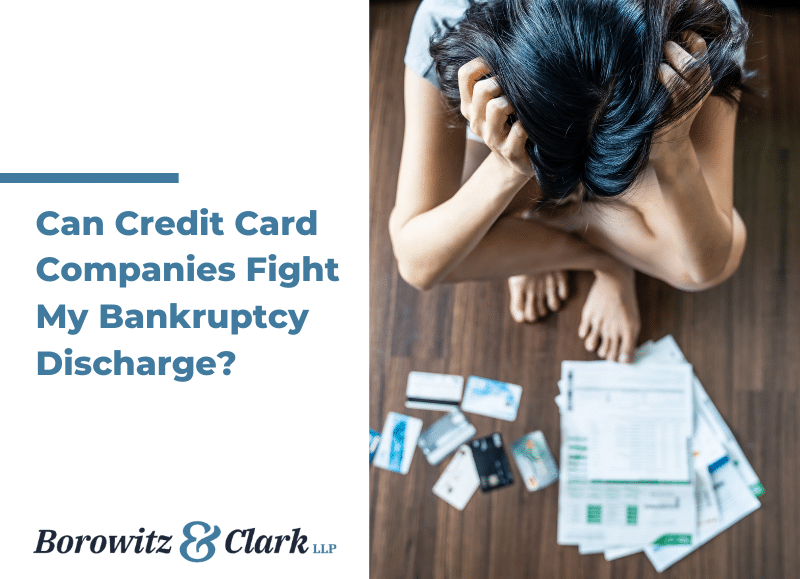Bankruptcy offers an opportunity to have credit card debt discharged, but what role do credit card companies play in this? The idea of seeing relief around the corner only to have a creditor deny your opportunity is a tough pill to swallow, but it’s a valid possibility. Here’s what you need to know to protect yourself.

Table of Contents
Credit card debt is a common concern for consumers. In 2022, the average American household with credit card debt owed more than $5,823. That’s a big problem, because interest rates on credit cards can be in the range of 30%, making it difficult to ever repay what you owe.
Fortunately, for individuals struggling to manage their credit card debt while still paying for rent, utilities, food, and other essentials, the law provides a solution: wiping out credit card debt in bankruptcy. Ordinarily, when you file for bankruptcy, the court discharges your unsecured debts (including credit card debts) at the end of the process.
Unfortunately, in some circumstances, your credit card issuer may challenge your right to wipe out debt, and the court may ask you for evidence that you did not obtain or use the credit card fraudulently. Keep reading to learn more about credit card debt in bankruptcy, issuers’ challenges, and how you can protect yourself against them.
Article at a Glance
- You can discharge credit card debt in bankruptcy under either Chapter 7 or Chapter 13 of the Bankruptcy Code.
- In some circumstances, a credit card issuer may challenge your right to have credit card debt discharged, either in whole or in part.
- You can defeat a credit card company’s challenge by being careful with how you use credit prior to bankruptcy and providing evidence of your intentions during bankruptcy.
How to Wipe Out Credit Card Debt in Bankruptcy
When you file for bankruptcy, you get the protection of the automatic stay. The automatic stay halts all collection attempts, including lawsuits, wage garnishment, foreclosures, and repossessions. It lasts for the duration of the bankruptcy and is meant to give you time to get your finances in order.
Consumers generally file under either Chapter 7 or Chapter 13. In a Chapter 7 bankruptcy, you turn over your nonexempt assets to the bankruptcy trustee. The trustee sells these assets and pays the proceeds toward your unsecured debt. However, most filers can protect all of their property using California’s bankruptcy exemptions.
In a Chapter 13 bankruptcy, you’ll work out a payment plan that takes into account your income and expenses.
At the end of either process, your remaining unsecured debt is discharged—that means it’s forgiven, and it goes away forever. Most filers pay pennies on the dollar for their unsecured debts—including things like medical bills and credit cards.
Credit Card Companies May Challenge a Bankruptcy
Because filers generally pay so little of their credit card debt in bankruptcy, card issuers may challenge a debtor’s discharge through an adversarial proceeding. The basis of the legal claim is that the debt was incurred by fraud and so should be excluded from discharge. This is sometimes called a “non-dischargeability action.”
Credit card issuers can win this non-dischargeability action under one of two legal theories:
- First, they may claim that the application you submitted to get the card in the first place was fraudulent.
- Second, and much more commonly, they may claim that you used the card to rack up debt without any intention of repaying it.
Creditors can make these claims against both Chapter 7 filers and Chapter 13 filers.
How Creditors Can Win
For the first type of claim, the credit card issuer can use your financial documents to prove that you lied, or left out important information, on your application. For the second type of claim, the credit card issuer must show that you used the card without intending to repay the debt.

An expert tip from Barry
It’s impossible for the court to find out what you were actually thinking when you got a credit card and made purchases, so it will look at circumstantial evidence that you acted fraudulently. For example, if you make a lot of large purchases immediately before you file for bankruptcy, it may look to the court like you never intended to repay the debt.
Likewise, the court may be suspicious if you take out a brand-new credit card, make purchases, and file for bankruptcy shortly thereafter. Using the credit card for luxury goods or travel is another indicator of fraud—the court will assume that you knew you couldn’t repay the cost of those things. Taking out large cash advances shortly before filing is also suspicious.
In addition to these specific types of uses, the court will examine your general financial behavior. Borrowing on one card to pay off another, regularly exceeding your credit limit, using your card when you’re unemployed, and filing when you have a large outstanding balance can all indicate that you didn’t intend to repay the debt.
Because the evidence that is available will vary from case to case, your credit card issuer can choose to challenge the dischargeability of the whole balance or only of specific charges on your card.
How Can I Avoid Creditor Challenges?
First, there is no rule about how long you will have to wait after making large purchases. In general, however, the longer the time between using the card and filing for bankruptcy, the better. If you use the card when you’re in financial distress, the court may decide that you knew you wouldn’t be able to repay it. Try to avoid using your card for at least 90 days before filing for bankruptcy.
If a creditor does try to prevent you from discharging your credit card debt in bankruptcy, you may be able to settle with the credit card issuer out of court. Lawsuits are expensive and time-consuming, and the credit card issuer doesn’t want to go through the hassle of a trial any more than you do.
And even if the suit goes to trial, you can still win. Bring documentation showing that you thought you would be able to repay the debt.
Should I File Bankruptcy for Credit Card Debt?
If you’re struggling with credit card debt (or any other kind of debt, for that matter) reach out to one of our experienced bankruptcy attorneys. In a free consultation, we’ll discuss your circumstances, your goals, and your options. The best way to win a lawsuit is to not have one filed against you. Experienced attorneys can assist in avoiding a credit card issuer’s challenge altogether.
